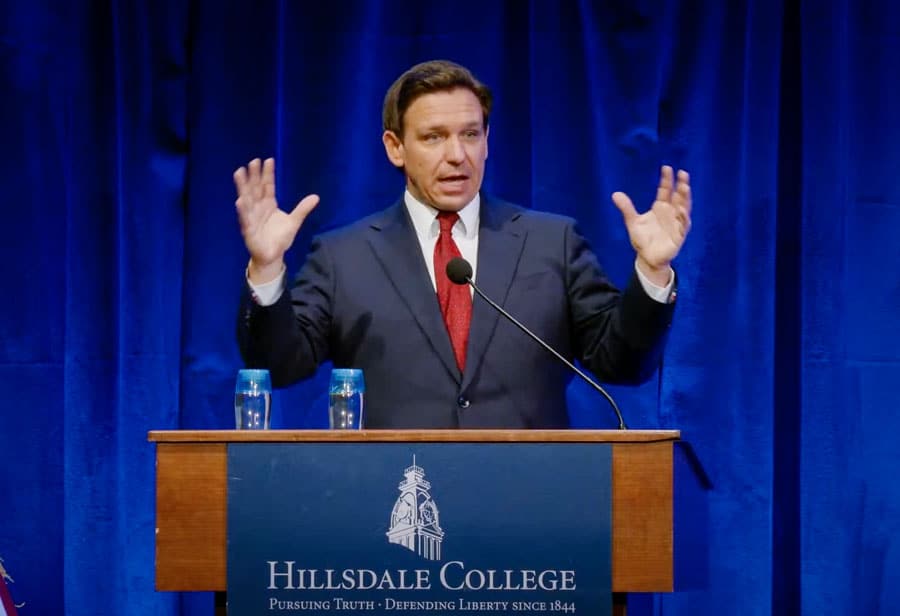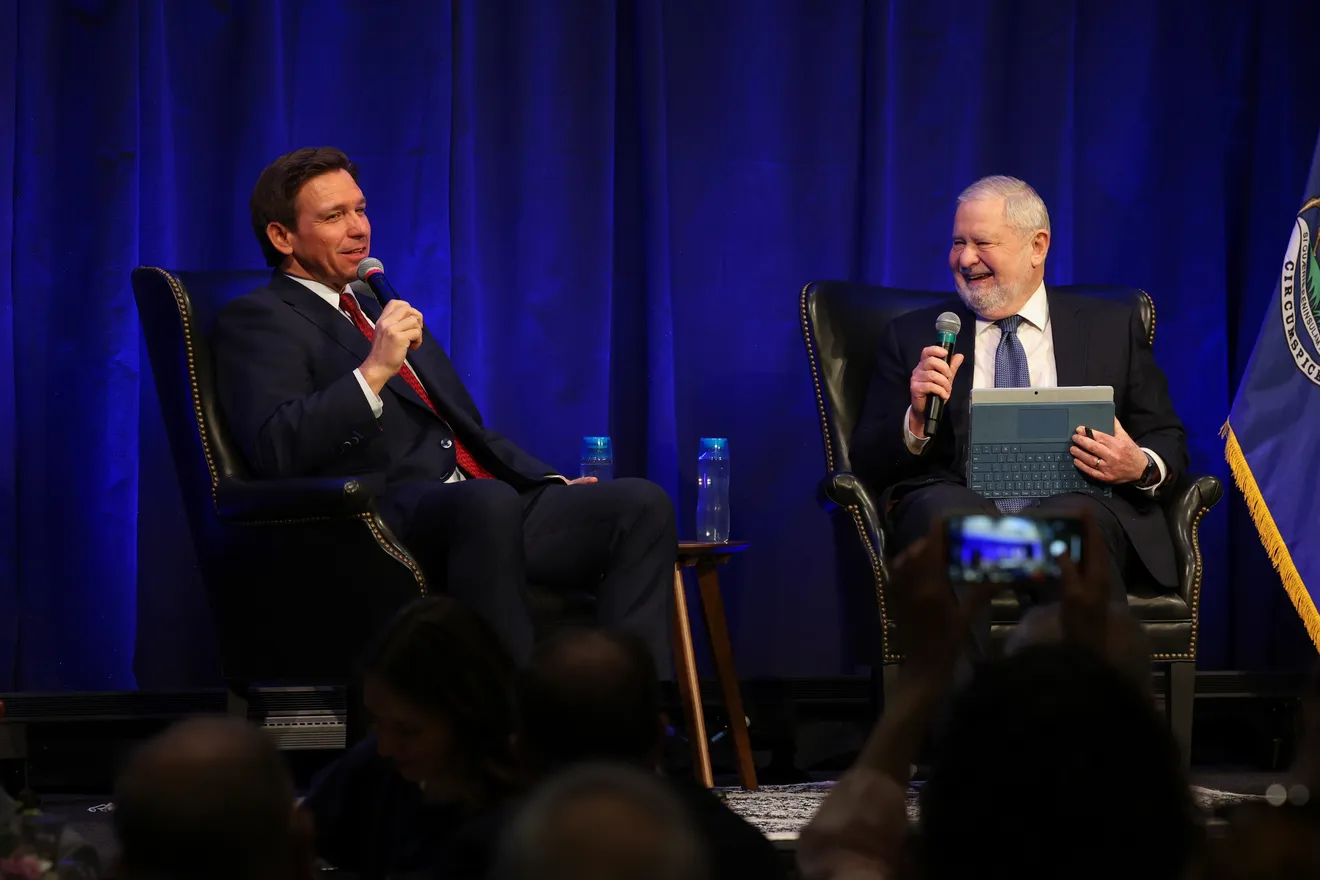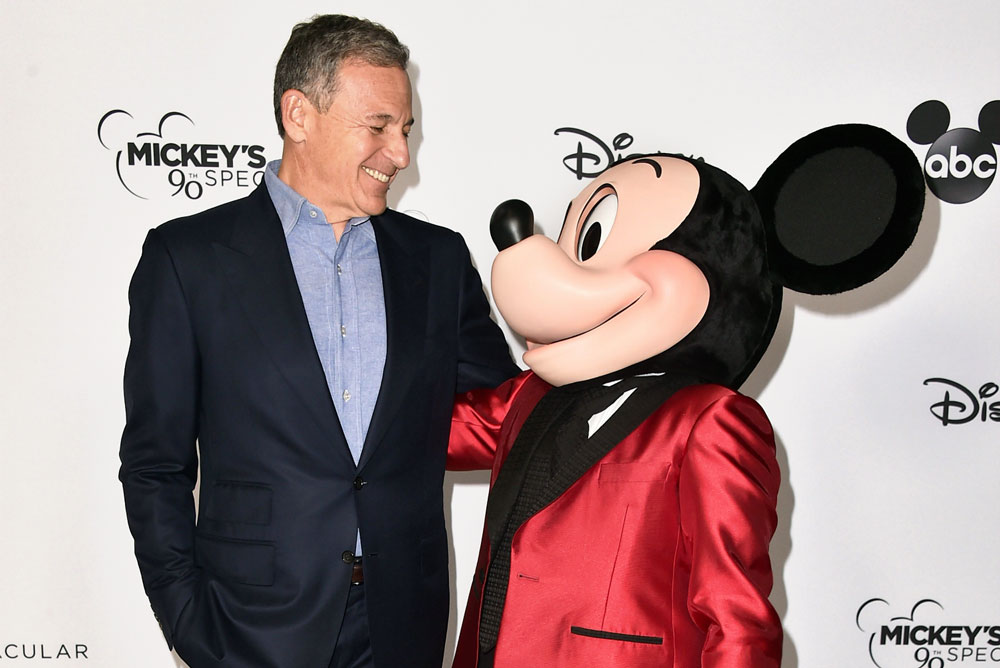
Governor Ron DeSantis promised new action against Walt Disney World in the escalating battle between Florida and its biggest employer during a sit-down at Hillsdale College in Michigan. This post shares the pertinent part of his statement, plus commentary about what each side stands to gain and lose in this still-ongoing dispute.
Earlier this week, Governor DeSantis sent a letter formally requesting that Florida’s Chief Inspector General investigate the former Reedy Creek Improvement District board and Disney employees for their adherence to state civil and criminal laws and ethics requirements.
At issue is a 30-year development agreement made between the Reedy Creek Improvement District and the Walt Disney Company prior to the new Board of Supervisors taking over. Those agreements consist of restrictive covenants, license agreement, and developer’s agreement that were discussed at a public hearing by RCID on February 8. The relevant documents were then published publicly (and can be found online here).
Only a few hours later at the company’s 2023 Annual Meeting of Shareholders, Disney CEO Bob Iger fired back. While conceding that last year the company did not handle the public position it took on pending Florida legislation very well, he contended that Disney has a right to freedom of speech. Iger asserted that DeSantis “got very angry and he’s decided to retaliate” against Disney as a result, “in effect seeking to punish a company for its exercise of a constitutional right.”
Iger added that Walt Disney World has over 75,000 Cast Members, and the resort complex has created countless thousands of indirect jobs throughout Central Florida, as Disney has transformed the region into a tourism powerhouse. Iger indicated that approximately 50 million people will visit Walt Disney World in 2023 and that Disney is the largest taxpayer in Florida.
He also revealed that the company has a plan to invest over $17 billion in Walt Disney World over the next decade that will create 13,000 new jobs. Iger concluded that “to retaliate for a position the company took, sounds not just anti-business but it sounds anti-Florida, and I’ll just leave it at that.” All of this week’s earlier developments are covered in full here.

In essence, DeSantis responded to that, dedicating several minutes of his sit-down in Michigan to his battle with Disney. The first couple of minutes were mostly an uneventful recap of what had already happened. After that, he turned to the latest developments, addressing the development agreement. Here are those comments from DeSantis in full:
Disney trying to do these agreements very quietly before we took control, and they’re trying to act like they pulled one over on us. There will be a lot that comes out over the next month or two, but suffice to say, the legislature is going to void anything Disney did on the way out the door.
Now that Disney has reopened this issue, we’re not just going to void the development agreement they tried to do; we’re going to look at things like taxes on the hotels; we’re going to look at things like tolls on the roads; we’re going to look at things like developing some of the property that the district owns.
At the end of the day, what I think what Disney has tried to do is say they should be able to operate outside the context of our constitutional system in Florida. No, we took this action prior to the election, we won overwhelmingly.
They are not superior to the people of Florida. Come hell or high water, we are going to make sure that that policy of Florida carries the day. So they can keep trying to do things, but ultimately, we’re going to win on every single issue involving Disney, I can tell you that.

As a preface to the commentary in our last post about Florida v. Disney, we cautioned against jumping to premature conclusions or declaring victors. Again, this standoff is incredibly multifaceted, involving the intersection of law and politics. The Reedy Creek saga involves myriad complex little-understood legal issues…plus politics.
Although certain aspects are ascertainable and relevant to the legal challenge and its likelihood of success, the eventual outcome as a whole is not. No one should pretend to know how it’ll play out from here. Most Walt Disney World fans and those in the mainstream media clearly did not heed our warnings. There have been countless articles, op-eds, memes, and even political cartoons about how Disney defeated, outsmarted, or outwitted DeSantis.
All of this is premature. Just as it was premature when DeSantis took his own victory lap during his book tour/presidential campaign, writing op-eds and delivering stump speeches about how he beat Disney.

In all likelihood, DeSantis cannot or will not let this go precisely because of the narrative that has emerged in the last couple of weeks. Between Disney’s last-minute development agreement and CEO Bob Iger going on the offensive with comments during the 2023 Annual Meeting of Shareholders, DeSantis likely felt the need to respond.
From his perspective, DeSantis could not let Iger’s comments go unanswered. He could not let Disney to have the last word, or allow there to be a perception that the company had beaten him, giving his opposition’s allies an opening to contend that “Ron DeSantis just got out-negotiated by Mickey Mouse.”

Although I’ve admonished others against drawing premature conclusions, I can’t help but wonder whether now is when DeSantis claims a victory and lets this finally die. To be clear, I’m not suggesting that he will. Time and time again, I’ve expected that he’d be satisfied with a superficial win and let issues go; instead, he has followed through.
This time might be different. (Famous last words!) So long as Disney doesn’t issue a follow-up statement and DeSantis maintains the last words, I wonder what he has to gain politically by continuing to drag this out. Last year, the answer was obvious and the approach was made all the more obvious given that Bob Chapek was a less-than-formidable foe. No matter which “side” you’re on in this debate, it’s fair to say that Chapek did not handle matters well and DeSantis scored countless political points with his base.

The calculus is decidedly different now. For one thing, Bob Iger is back at the helm and has a decidedly defter touch. His statements during the shareholder meeting threaded the needle perfectly, hitting precisely the points he should have to ‘win’ in the court of public opinion, while also offering concessions and admitting how Disney (via Chapek) mishandled its original response last year.
Unsurprisingly, this standoff worked out much better for DeSantis when his adversary was inept or nonresponsive. Sparring with a shrewd CEO is not so simple, adding an element of unpredictability and downside risk.
For another thing, DeSantis has already succeeded at his original mission of raising his national profile and scoring points with his base. By prolonging this, what else does he stand to gain? What does he stand to lose? Beyond the base that he’s already won over, how is this likely to be perceived by ‘undecideds’ who did not previously hold an opinion in the Disney v. Florida battle? That last one is a question that probably no one reading this can answer for themselves; your mind was already made up.

It’s almost impossible to be an impartial observer here. Everyone has their biases. With that in mind, my personal perception is that DeSantis stands little to gain by continuing to drag this out. I would hazard a guess that most voters know who pays hotel occupancy taxes and the fees associated with toll roads.
I cannot imagine that being particularly popular, let alone with locals or Cast Members who will end up paying those tolls in addition to the tourists. This angle simply does not strike me as a winner; advocating for toll roads does not hit the same as cultivating culture wars or punishing the company itself. (There’s a reason neither party is overtly “pro-toll roads” in its platform–they are largely unpopular with voters.)
Those same allies who fired shots that DeSantis got out-negotiated by Mickey Mouse can claim that he wants to raise taxes if he pushes that point further. Hard to see that as a winner even with the base. To that same point, the values or principles at play also become murkier the longer this continues. Iger already recalibrated this as an issue of speech and business; now it’s poised to become one of taxation. That’s quite far afield from where it started last year.

DeSantis has promised civil and criminal investigations into the activity of Disney and the prior Reedy Creek board. Investigations like that can take a lot of time, and if he’s asked about this going forward, he could simply say, “that’s a pending legal matter and I don’t want to comment, but I’m looking forward to any illegal activity being brought to light and addressed to the fullest extent of the law. Florida will win in the end.”
Basically, a twist on what DeSantis actually did say during his speech at Hillsdale College, but minus the tax stuff and drawn out over a longer time horizon than the next month or two. He could use that line until 2024 if he were so inclined. Politicians make hollow promises with zero follow-through all the time; no one would bat an eye.

Clearly, DeSantis is not the only one who needs to do a sober evaluation on what there is to gain versus lose. It would appear that Bob Iger has done precisely that, as he didn’t simply let the development agreement speak for itself. Iger didn’t have to say anything when questioned at the shareholder meeting; he could have deferred to statements already made by the company or its legal counsel. His comments were calculated.
I suspect that internal conclusion reached by Disney is that there’s little left to lose by speaking up. That the company has already taken as big of a hit as it can in the court of public opinion, and that DeSantis has played all of his cards and earned as much “goodwill” as he can from this. That the company is unlikely to alienate anyone it already hasn’t, and if anything, is starting to come across as the more sympathetic party in the dispute. (That the tides are turning is my perception, but there’s undoubtedly selection bias in Disney fan circles!)
The thought process is likely that Iger can gain some public support without sustaining much more damage. His points about economics and free speech are precisely the way to do that–he made the best possible arguments available to him. With that said, now that he has made those points, what else does Disney stand to gain by responding yet again? Personally, I feel like we are very close to this being a lose-lose scenario where both sides suffer by the battle being drawn out further.
Of course, that all pertains to the court of public opinion, and overlooks how this will play out in actual courts, or what the governor might otherwise be able to do to punish Walt Disney World and its visitors. That all requires a more vivid imagination and I’m not comfortable speculating about what other cards DeSantis might have up his sleeve. I certainly would not have guessed “raise taxes” to be one of them a week ago, but here we are.
Planning a Walt Disney World trip? Learn about hotels on our Walt Disney World Hotels Reviews page. For where to eat, read our Walt Disney World Restaurant Reviews. To save money on tickets or determine which type to buy, read our Tips for Saving Money on Walt Disney World Tickets post. Our What to Pack for Disney Trips post takes a unique look at clever items to take. For what to do and when to do it, our Walt Disney World Ride Guides will help. For comprehensive advice, the best place to start is our Walt Disney World Trip Planning Guide for everything you need to know!
YOUR THOUGHTS
What is your reaction to the latest developments in the battle of Florida v. Disney? Thoughts on DeSantis’ plan to punish Walt Disney World visitors, locals, and Cast Members with occupancy taxes and toll roads? Think Bob Iger hit the right notes during the Annual Shareholders meeting, or do you agree with the governor’s approach? Or, is this one of this no-win situations where everyone loses the longer it’s drawn out? Keep the comments civil, and avoid personal attacks or perpetuating pointless culture wars. Respectfully debating the differing approaches is totally fine, but don’t attack others, go on pointless diatribes, or troll for controversy.





